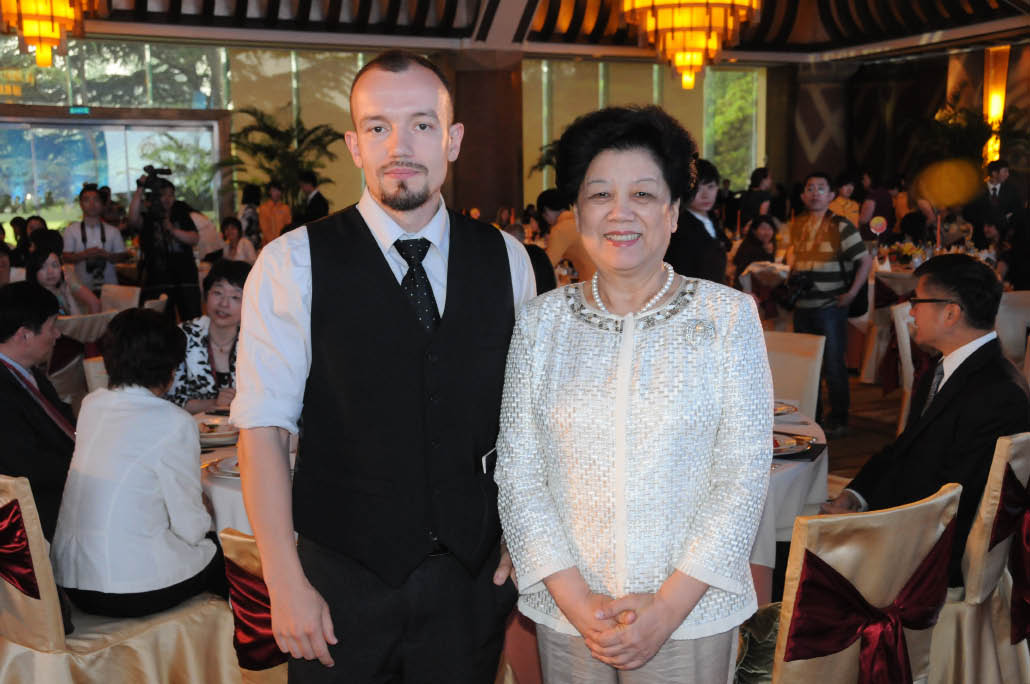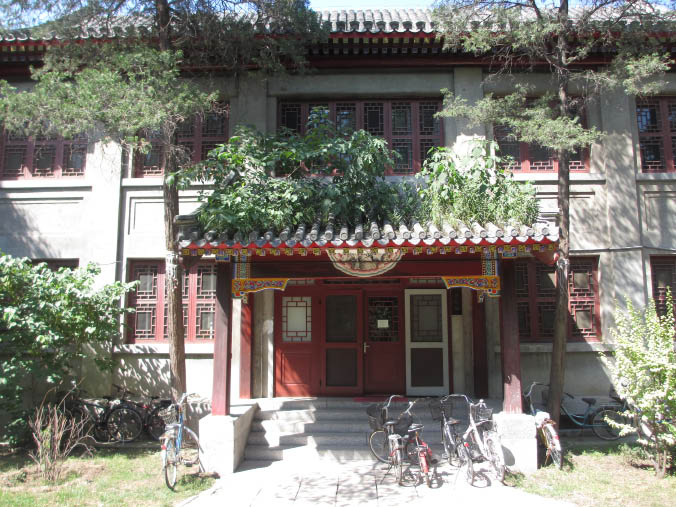China and the West Grow Closer through Higher Education Cooperation
– An Interview with Dr. Thorsten Pattberg, a Research Fellow at the Institute for Advanced Humanistic Studies, Peking University
By VAUGHAN WINTERBOTTOM
CHINESE higher education is changing fast.
The sector is rapidly expanding. A decade ago roughly one million college students graduated per year. This year there were almost seven million graduates, according to a recent statement from the State Council.
The quality of teaching and research at universities has improved significantly since the turn of the millennium. A massive increase in university funding is largely to thank for this.
Project 211, initiated at the end of the 1990s, saw 100 leading universities receive a total of RMB 36.8 billion to build physical plant. Project 985, launched soon after, sought to create world-class universities out of 39 institutions. Peking University alone received US $360 million under the project. The nine leading universities from these 39 institutions subsequently received extra cash injections with the formation of the C9 League, China’s answer to America’s Ivy League.
It’s not just top-flight universities that have benefited from state funding. In May this year, the government unveiled plans to inject US $1.62 billion between 2012 and 2015 into 100 higher institutions in Central and West China.
The rise in the quality of Chinese higher education is cogently illustrated in international university rankings. A decade ago, Peking University and Tsinghua University, neighbors in Beijing, were the only two domestic institutions to feature on most lists. In August this year, Shanghai Jiaotong University’s 2013 Academic Ranking of the World Universities, considered one of the three most influential and widely observed international university rankings, registered 42 Chinese institutions in the world’s top 500. That places China in front of Germany (37) and second only to the U.S. (149) for institutions in the top 500 by country.
While league tables present a picture of competition between nations in higher education, in reality, this couldn’t be further from the truth. Chinese institutions have begun to excel thanks to deepening cooperation with leading world universities. Administrators in the West have been eager to share their experiences with China; after all, education isn’t a zero-sum game. Many have in fact criticized league tables, and will probably continue to do so, for emphasizing competition and “rankings” over cooperation and exchanges.
In line with the push to learn from the West, China has put much effort into attracting foreign academic talent to teach and research on the country’s campuses. Many such researchers can be found in labs and lecture halls throughout the country. They are working, both directly and indirectly, to bring foreign best practices to Chinese universities.
China Today recently sat down with one such researcher to discuss the state of Chinese higher education. Dr. Thorsten Pattberg, a German native, is a research fellow with the Institute for Advanced Humanistic Studies at Peking University. Before taking up residence in Beijing, Pattberg was a visiting fellow at Harvard University, and a foreign researcher at the University of Tokyo. It’s safe to say, then, that he’s an expert on higher education. Highlights from the interview follow.
|
 |
| Thorsten Pattberg with Madame Chen Zhili, former Minister of Education of the People's Republic of China. |
China Today: Could you tell us a little about your research? Why is it important?
Thorsten Pattberg: My research boils down to this: to preserve the full power and authenticity of the “Chinese World,” we must adopt Chinese key terminologies into the global language. For example, the “shengren” (editor’s note: sage) in the Confucian tradition are as unique and clearly defined as, say, the Buddhas in Buddhism – they exemplify non-Western archetypes of wisdom.
I am not the only one who is working on translation history. There is Haneda Masashi in Japan, Roger T. Ames in the U.S., Rajiv Malhotra in India, and S. A. Mirhosseini in Iran. The list goes on. We all share a common vision that we want to expand global knowledge by spotting the “untranslatables” in each of the great traditions and reel them back into world history.
CT: In your experience, is there an overemphasis on university ranking tables in China? Does overemphasis on ranking tables create distortions that detract from student experiences at Chinese universities?
TP: League tables are crucial in China, and academics are often judged by their alma mater and where they work. That sounds brutal, but I think this is no different from the United States. Our institute is founded by a former Harvard professor, and three of the four researchers spent time at Harvard, including myself. So, frankly, this is an old boy school.
Rankings, or more accurately, the effects they have, are very real. Especially in a very competitive society with 1.3 billion people and a (Confucian) love for learning. You may think you’re a genius, but if you don’t get into the best schools, you kind of contradict yourself, no? Chinese students are extremely hard working; there are just so many gifted people here, it’s mind-blowing. Of course, there are many other ways to reach academic fame. But I guess most Chinese scholars would agree that the surest path is to be affiliated with an elite university.
|
 |
| The Institute for Advanced Humanistic Studies (IAHS) at Peking University. |
CT: How has your academic experience at Peking University differed from your experiences at other universities?
TP: Harvard seems tiny but it has a superior infrastructure and library system. Still, many envied my having the chance to come to Peking University. The grass always looks greener on the other side, I guess.
I don’t think that China will move toward more Western modes of operating. For example, China has a very different salary system. In effect, you are paid only a symbolic income, that’s often not enough to rent a flat, let alone raise a family. The rest you have to earn through various means and perks, like subsidized food and housing, multiple job positions, business travels, project money, and so on. Chinese researchers often get paid bonuses for high-impact journal publications, or book publications. As a foreign researcher you may find other opportunities for additional income, and, needless to say, you will absolutely rely on your entrepreneurial spirit to support yourself . Most Westerners find themselves morally unprepared to double and triple their income the way the Chinese do.
CT: What is your opinion of foreigners researching at Chinese universities in general? Is researching in China a financially attractive option?
TP: China is hungry for talent. Think about the environment, the arts, architecture, food industry, pharmacy, finance, automobile and transport – everything is bigger here than elsewhere. China massively targets overseas Chinese to return to their motherland because they can adjust more easily to Chinese customs. For foreigners, there are often scholarships they can apply for, for example through the Fulbright Program of the U.S. Government, the Chinese Scholarship Council, or the German Academic Exchange Service, and so on. If you are a scientist, or an engineer, keep an eye out for multinationals or joint ventures in China – they are usually world-class and will be the perfect boost to your career in Asia.
In general I would say that foreign researchers are still a rare sight in China, and most are funded (at least partly) from abroad. I always say, first get a faculty position in the West and then come here as a visiting scholar. That’s the way to do it.
CT: Is there a big push at Peking University to attract foreign expertise with financial incentives?
TP: There are great pushes to attract foreign expertise. When I came to China in 2003, I got a study-fee waiver and that was it. I spent many years in “academic poverty,” and almost never left the campus. But these days foreigners are much more pampered. The PKU International Office recently introduced a stipend program for postgraduates that pays allegedly over RMB 20,000 per month to its fellows, plus perks like return flights, under one condition: you must have an undergraduate degree from one of the top 100 universities in the world.
And Tsinghua University, which lies just across the street, this year received a US $300 million endowment from the U.S. Blackstone Group founder Stephen A. Schwarzman who wishes to provide scholarships for tens of thousands of “future leaders.”
CT: Are there any quirks in the Chinese higher education system that throw foreign researchers off?
TP: Well, for instance, China is not like the U.S. where new ideas are valued for their own sake. In China, scholars want to protect the status quo at all cost, especially in politics, history, and guoxue (China studies). Concretely, this means that docs and postdocs all quote their professors, no matter how outdated their theories might be, and sharp criticism is a taboo. Respect, face, and piety are more valued than truth, proof, or critical thinking. To put it in other words: The Chinese world view has always been more holistic and inductive, or less narrow and deductive, than the Western one, with all its advantages and disadvantages.
CT: Do you foresee any kind of clash, or academic arms race, between China and the West as Chinese universities continue to improve?
TP: China’s universities will always be mainly Chinese. It’s a bit like Tokyo University in Japan. It is world class, but you can’t really say it’s competing for the world’s talent pool. Likewise, Chinese universities will always be mainly for Chinese people. Most Western undergraduates will find the language too difficult and the culture too exotic. But that’s just my opinion.

